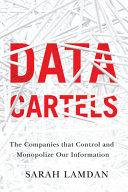[Read] PDF/Book Data Cartels: The Companies That Control and Monopolize Our InformationSarah Lamdan

Ebook PDF Data Cartels: The Companies That Control and Monopolize Our Information | EBOOK ONLINE DOWNLOAD
If you want to download free Ebook, you are in the right place to download Ebook. Ebook/PDF Data Cartels: The Companies That Control and Monopolize Our Information DOWNLOAD in English is available for free here
[Download] Link : [Downlload Now] Data Cartels: The Companies That Control and Monopolize Our Information
Read More : [Read Now] Data Cartels: The Companies That Control and Monopolize Our Information
Description
In our digital world, data is power, and information hoarders reign supreme. The practices of these digital pillagers are analogous to those of cartels--they use intimidation, aggression, and force to maintain control and power. Sarah Lamdan brings us into the unregulated underworld of the "data cartels," demonstrating how the entities mining, hoarding, commodifying, and selling our data and informational resources perpetuate social inequalities and threaten the democratic sharing of knowledge. The companies at the center of this book are not household names like Google. They fly under the radar and self-identify as "data analytics" or "business
solutions" operations. These companies supply the digital lifeblood that flow through the circulatory system of the internet. With their control over data, they can prevent the free flow of information to places where it is needed, and simultaneously distribute private information to predatory entities. Just a few companies dominate most of our critical informational resources, from scientific research and financial data to the law. They are also data brokers, selling our personal data to law enforcement and other government agencies that determine whether we should be eligible for social services, and they sell "risk" products that insurance companies, employers, landlords, and healthcare systems use to make decisions. Alarmingly, everything they're doing is perfectly legal. Ranging from small information firms to billion-dollar data giants like Thomson Reuters and RELX Group, these companies masterfully exploit outdated information and privacy laws, curating online information in a way that amplifies digital racism and targets marginalized communities. In this book, Lamdan contends that privatization and tech exceptionalism have prevented us from creating effective legal regulation. Lack of legal intervention has allowed oversized information oligopolies to coalesce. In addition to specific legal and market-based solutions, Lamdan calls for treating information like a public good and creating digital infrastructure that supports our democratic ideals.
